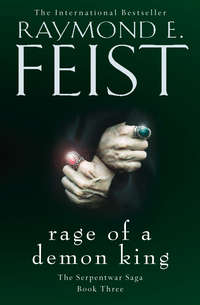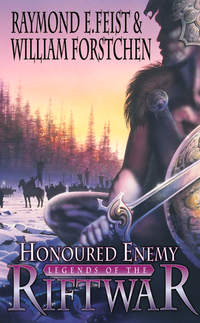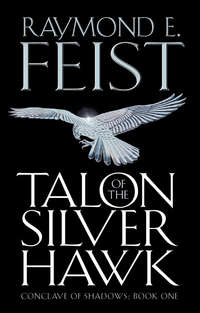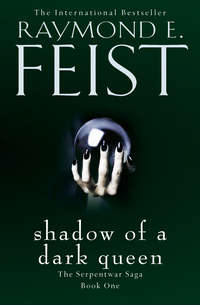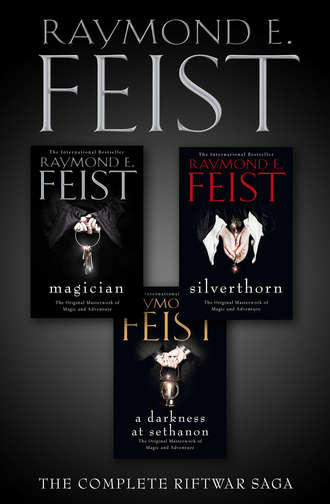
Полная версия
The Complete Riftwar Saga Trilogy: Magician, Silverthorn, A Darkness at Sethanon
‘Why, dwarf? Is it not true with thine own people that when one dieth, it is accounted how well he lived, rather than how long?’
‘You have the truth of that.’
‘Then why should it matter if the death hour is known or not? It is still the same. I have had all that one of my kind could hope for: health, mates, young, riches, and rest. These are all I have ever wanted, and I have had them.’
‘’Tis a wise thing to know what is wanted, and wiser still to know when ’tis achieved,’ said Dolgan.
‘True. And still wiser to know when it is unachievable, for then striving is folly. It is the way of my people to sit the deathwatch, but there are none of my kind near enough to call. I would ask thee to wait for my passing before thy leaving. Wilt thou?’
Dolgan looked at Tomas, who bobbed his head in agreement. ‘Aye, dragon, we will, though it is not a thing to gladden our hearts.’
The dragon closed his eyes; Tomas and Dolgan could see they were beginning to swell shut. ‘Thanks to thee, Dolgan, and to thee, Tomas.’
The dragon lay there and spoke to them of his life, flying the skies of Midkemia, of far lands where tigers lived in cities, and mountains where eagles could speak. Tales of wonder and awe were told, long into the night.
When his voice began to falter, Rhuagh said, ‘Once a man came to this place, a magician of mighty arts. He could not be turned from this place by my magic, nor could I slay him. For three days we battled, his arts against mine, and when done, he had bested me. I thought he would slay me and carry off my riches, but instead he stayed, for his only thought was to learn my magic, so that it would not be lost when I passed.’
Tomas sat in wonder, for as little as he knew about magic from Pug, he thought this a marvelous thing. In his mind’s eye he could see the titanic struggle and the great powers working.
‘With him he had a strange creature, much like a goblin, though upright, and with features of finer aspect. For three years he stayed with me, while his servant came and went. He learned all I could teach, for I could deny him not. But he taught as well, and his wisdom gave me great comfort. It was because of him that I learned to respect life, no matter how mean of character, and vowed to spare any that came to me. He also had suffered at the hands of others, as I had in the wars with men, for much that I cherished was lost. This man had the art of healing the wounds of the heart and mind, and when he left, I felt the victor, not the vanquished.’ He paused and swallowed, and Tomas could see that speech was coming to him with more difficulty. ‘If a dragon could not have attended my deathwatch, I would as soon have him sit here, for he was the first of thy kind, boy, that I would count a friend.’
‘Who was he, Rhuagh?’ Tomas asked.
‘He was called Macros.’
Dolgan looked thoughtful. ‘I’ve heard his name, a magician of most puissant arts. He is nearly a myth, having lived somewhere to the east.’
‘A myth he is not, Dolgan,’ said Rhuagh, thickly. ‘Still, it may be that he is dead, for he dwelt with me ages ago.’ The dragon paused. ‘My time is now close, so I must finish. I would ask a boon of thee, dwarf.’ He moved his head slightly and said, ‘In yon box is a gift from the mage, to be used at this time. It is a rod fashioned of magic. Macros left it so that when I die no bones will be left for scavengers to pick over. Wilt thou bring it here?’
Dolgan went to the indicated chest. He opened it to discover a black metal rod lying upon a blue velvet cloth. He picked up the rod and found it surprisingly heavy for its size. He carried it over to the dragon.
The dragon spoke, his words nearly unintelligible, for his tongue was swollen. ‘In a moment, touch the rod to me, Dolgan, for then will I end.’
‘Aye,’ said Dolgan, ‘though it will give me scant pleasure to see your end, dragon.’
‘Before that I have one last thing to tell. In a box next to the other is a gift for thee, dwarf. Thou mayest take whatever else here pleaseth thee, for I will have no use for any of it. But of all in this hall, that in the box is what I wish thee to have.’ He tried to move his head toward Tomas, but could not. ‘Tomas, thanks to thee, for spending my last with me. In the box with the dwarf’s gift is one for you. Take whatever else pleaseth thee, also, for thy heart is good.’ He drew a deep breath, and Tomas could hear it rattle in his throat. ‘Now, Dolgan.’
Dolgan extended the rod and lightly touched the dragon on the head with it. At first nothing happened. Rhuagh said softly, ‘It was Macros’s last gift.’
Suddenly a soft golden light began to form around the dragon. A faint humming could be heard, as if the walls of the hall reverberated with fey music. The sound increased as the light grew brighter and began to pulse with energy. Tomas and Dolgan watched as the discolored patches faded from Rhuagh’s scales. His hide shone with golden sparkle, and the film started to lift from his eyes. He slowly raised his head, and they knew he could again see the hall around him. His crest stood erect, and his wings lifted, showing the rich silver sheen underneath. The yellowed teeth became brilliant white, and his faded black claws shone like polished ebony as he stood upright, lifting his head high.
Dolgan said softly, ‘’Tis the grandest sight I’ve ever beheld.’
Slowly the light grew in intensity as Rhuagh returned to the image of his youthful power. He pulled himself to his full, impressive height, his crest dancing with silver lights. The dragon threw back his head, a youthful, vigorous motion, and with a shout of joy sent a powerful blast of flame up to the high vaulted ceiling. With a roar like a hundred trumpets he shouted, ‘I thank thee, Macros. It is a princely gift indeed.’
Then the strangely harmonic thrumming changed in tone, becoming more insistent, louder. For a brief instant both Dolgan and Tomas thought a voice could be heard among the pulsing tones, a deep, hollow echo saying, ‘You are welcome, friend.’
Tomas felt wetness on his face, and touched it. Tears of joy from the dragon’s sheer beauty were running down his cheeks. The dragon’s great golden wings unfolded, as if he were about to launch himself in flight. The shimmering light became so bright, Tomas and Dolgan could barely stand to look, though they could not pull their eyes from the spectacle. The sound in the room grew to a pitch so loud, dust fell from the ceiling upon their heads, and they could feel the floor shake. The dragon launched himself upward, wings extended, then vanished in a blinding flash of cold white light. Suddenly the room was as it had been and the sound was gone.
The emptiness in the cavern felt oppressive after the dragon vanished, and Tomas looked at the dwarf. ‘Let’s leave, Dolgan. I have little wish to stay.’
Dolgan looked thoughtful. ‘Aye, Tomas, I also have little desire to stay. Still, there is the matter of the dragon’s gifts.’ He crossed over to the box the dragon had identified and opened it.
Dolgan’s eyes became round as he reached in and pulled out a dwarven hammer. He held it out before himself and looked upon it with reverence. The head was made from a silver metal that shone in the lantern light with bluish highlights. Across the side were carved dwarven symbols. The haft was carved oak, with scrollwork running the length. It was polished, and the deep rich grain showed through the finish. Dolgan said, faintly, ‘’Tis the Hammer of Tholin. Long removed from my people. Its return will cause rejoicing in every dwarven long hall throughout the West. It is the symbol of our last king, lost ages ago.’
Tomas came over to watch and saw something else in the box. He reached past Dolgan and pulled out a large bundle of white cloth. He unrolled it and found that the cloth was a tabard of white, with a golden dragon emblazoned on the front. Inside were a shield with the same device and a golden helm. Most marvelous of all was a golden sword with a white hilt. Its scabbard was fashioned from a smooth white material like ivory, but stronger, like metal. Beneath the bundle lay a coat of golden chain mail, which he removed with an ‘Oh!’ of wonder.
Dolgan watched him and said, ‘Take them, boy. The dragon said it was your gift.’
‘They are much too fine for me, Dolgan. They belong to a prince or a king.’
‘I’m thinking the previous owner has scant use for them, laddie. They were freely given, and you may do what you will, but I think that there is something special to them, or else they wouldn’t have been placed in the box with the hammer. Tholin’s hammer is a weapon of power, forged in the ancient hearths of the Mac Cadman Alair, the oldest mine in these mountains. In it rests magic unsurpassed in the history of the dwarves. It is likely the gilded armor and sword are also such. It may be there is a purpose in their coming to you.’
Tomas thought for a moment, then quickly pulled off his great cloak. His tunic was no gambeson, but the golden mail went over it easily enough, being fashioned for someone of larger stature. He pulled the tabard over it and put the helm upon his head. Picking up the sword and shield, he stood before Dolgan. ‘Do I look foolish?’
The dwarf regarded him closely. ‘They are a bit large, but you’ll grow into them, no doubt.’ He thought he saw something in the way the boy stood and held the sword in one hand and the shield in the other. ‘No, Tomas, you do not look foolish. Perhaps not at ease, but not foolish. They are grand, and you will come to wear them as they were meant to be worn, I think.’
Tomas nodded, picked up his cloak, and turned toward the door, putting up his sword. The armor was surprisingly light, much lighter than what he had worn at Crydee. The boy said, ‘I don’t feel like taking anything else, Dolgan. I suppose that sounds strange.’
Dolgan walked over to him. ‘No, boy, for I also wish nothing of the dragon’s riches.’ With a backward glance at the hall, he added, ‘Though there will be nights to come when I will wonder at the wisdom of that. I may return someday, but I doubt it. Now let us find a way home.’ They set off and soon were in tunnels Dolgan knew well, taking them to the surface.
Dolgan gripped Tomas’s arm in silent warning. The boy knew enough not to speak. He also felt the same alarm he had experienced just before the wraith had attacked the day before. But this time it was almost physically felt. The undead creature was near. Putting down the lantern, Tomas shuttered it. His eyes widened in sudden astonishment, for instead of the expected blackness, he saw faintly the figure of the dwarf moving slowly forward. Without thought he said, ‘Dolgan—’
The dwarf turned, and suddenly a black form loomed up at his back. ‘Behind you!’ shouted Tomas.
Dolgan spun to confront the wraith, instinctively bringing up his shield and Tholin’s hammer. The undead creature struck at the dwarf, and only Dolgan’s battle-trained reflexes and dwarven ability to sense movement in the inky darkness saved him, for he took the contact on his iron-bosked shield. The creature howled in rage at the contact with iron. Then Dolgan lashed out with the legendary weapon of his ancestors, and the creature screamed as the hammer struck its form. Blue-green light sprang about the head of the hammer, and the creature retreated, wailing in agony.
‘Stay behind me,’ shouted Dolgan. ‘If iron irritates it, then Tholin’s hammer pains it. I may be able to drive it off.’
Tomas began to obey the dwarf, then found his right hand crossing to pull the golden sword free of the scabbard on his left hip. Suddenly the ill-fitting armor seemed to settle more comfortably around his shoulders, and the shield balanced upon his arm as if he had carried it for years. Without volition of his own, Tomas moved behind Dolgan, then stepped past, bringing the golden sword to the ready.
The creature seemed to hesitate, then moved toward Tomas. Tomas raised his sword, readying to strike. With a sound of utter terror, the wraith turned and fled. Dolgan glanced at Tomas, and something he saw made him hesitate as Tomas seemed to come to an awareness of himself and put up his sword.
Dolgan returned to the lantern and said, ‘Why did you do that, lad?’
Tomas said, ‘I . . . don’t know.’ Feeling suddenly self-conscious at having disobeyed the dwarf’s instructions, he said, ‘But it worked. The thing left.’
‘Aye, it worked,’ agreed Dolgan, removing the shutter from the lantern. In the light he studied the boy.
Tomas said, ‘I think your ancestor’s hammer was too much for it.’
Dolgan said nothing, but he knew that wasn’t the case. The creature had fled in fear from the sight of Tomas in his armor of white and gold. Then another thought struck the dwarf. ‘Boy, how did you know to warn me the creature was behind me?’
‘I saw it.’
Dolgan turned to look at Tomas with open astonishment. ‘You saw it? How? You had shuttered the lantern.’
‘I don’t know how. I just did.’
Dolgan closed the shutter on the lantern again and stood up. Moving a few feet away, he said, ‘Where am I now, lad?’
Without hesitation Tomas came to stand before him, placing a hand upon his shoulder. ‘Here.’
‘What—?’ said the dwarf.
Tomas touched the helm, then the shield. ‘You said they were special.’
‘Aye, lad. But I didn’t think they were that special.’
‘Should I take them off?’ asked the worried boy.
‘No, no.’ Leaving the lantern upon the floor, Dolgan said, ‘We can move more quickly if I don’t have to worry about what you can and can’t see.’ He forced a note of cheeriness into his voice. ‘And despite there being no two finer warriors in the land, it’s best if we don’t announce our presence with that light. The dragon’s telling of the moredhel being down in our mines gives me no comfort. If one band was brave enough to risk my people’s wrath, there may be others. Yon wraith may be terrified of your golden sword and my ancient hammer, but twenty or so moredhel might not be so easily impressed.’
Tomas could find nothing to say, so they started moving off into the darkness.
Three times they stopped and hid while hurrying groups of goblins and Dark Brothers passed nearby. From their dark vantage point they could see that many of those who passed harbored wounds or were aided by their kinsmen as they limped along. After the last group was gone, Dolgan turned to Tomas and said, ‘Never in history have the goblins and moredhel dared to enter our mines in such numbers. Too much do they fear my people to risk it.’
Tomas said, ‘They look pretty beat up, Dolgan, and they have females and young with them, and carry great bundles, too. They are fleeing something.’
The dwarf nodded. ‘They are all moving from the direction of the northern valley in the Grey Towers, heading toward the Green Heart. Something still drives them south.’
‘The Tsurani?’
Dolgan nodded. ‘My thought also. Come. We had best return to Caldara as quickly as we can.’ They set off and soon were in tunnels Dolgan knew well, taking them to the surface and home.
They were both exhausted when they reached Caldara five days later. The snows in the mountains were heavy, and the going was slow. As they approached the village, they were sighted by guards, and soon the entire village turned out to greet them.
They were taken to the village long hall, and Tomas was given a room. He was so tired that he fell asleep at once, and even the stout dwarf was fatigued. The dwarves agreed to call the village elders together the next day in council and discuss the latest news to reach the valley.
Tomas awoke feeling ravenous. He stretched as he stood up and was surprised to find no stiffness. He had fallen asleep in the golden mail and should have wakened to protesting joints and muscles. Instead he felt rested and well. He opened the door and stepped into a hall. He saw no one until he came to the central room of the long hall. There were several dwarves seated along the great table, with Dolgan at the head. Tomas saw one was Weylin, Dolgan’s son. Dolgan motioned the boy to a chair and introduced him to the company.
The dwarves all greeted Tomas, who made polite responses. Mostly he stared at the great feast of food on the table.
Dolgan laughed and said, ‘Help yourself, laddie; there is little cause for you to be hungry with the board full.’ Tomas heaped a plate with beef, cheese, and bread and took a flagon of ale, though he had little head for it and it was early in the day. He quickly consumed what was on the platter and helped himself to another portion, looking to see if anyone disapproved. Most of the dwarves were involved in a complicated discussion of an unknown nature to Tomas, having to do with the allocation of winter stores to various villages in the area.
Dolgan called a halt to the discussion and said, ‘Now that Tomas is with us, I think we had best speak of these Tsurani.’
Tomas’s ears pricked up at that, and he turned his attention fully to what was being said. Dolgan continued, ‘Since I left on patrol, we have had runners from Elvandar and Stone Mountain. There have been many sightings of these aliens near the North Pass. They have made camp in the hills south of Stone Mountain.’
One of the dwarves said, ‘That is Stone Mountain’s business, unless they call us to arms.’
Dolgan said, ‘True, Orwin, but there is also the news they have been seen moving in and out of the valley just south of the pass. They have intruded on lands traditionally ours, and that is the business of the Grey Towers.’
The dwarf addressed as Orwin nodded. ‘Indeed it is, but there is naught we can do until spring.’
Dolgan put his feet up on the table, lighting a pipe. ‘And that is true also. But we can be thankful the Tsurani can do naught until spring, as well.’
Tomas put down a joint of beef he was holding. ‘Has the blizzard struck?’
Dolgan looked at him. ‘Aye, laddie, the passes are all solid with snow, for the first winter blizzard came upon us last night. There will be nothing that can move out there, least of all an army.’
Tomas looked at Dolgan. ‘Then . . .’
‘Aye. You’ll guest with us this winter, for not even our hardiest runner could make his way out of these mountains to Crydee.’
Tomas sat back, for in spite of the comforts of the dwarven long hall, he wished for more familiar surroundings. Still, there was nothing that could be done. He resigned himself to that and returned his attention to his meal.
• CHAPTER ELEVEN •
Sorcerer’s Isle
THE WEARY GROUP TRUDGED INTO BORDON.
Around them rode a company of Natalese Rangers, dressed in their traditional grey tunics, trousers, and cloaks. They had been on patrol, had encountered the travelers a mile out of town, and were now escorting them. Borric was irritated that the rangers had not offered to let the exhausted travelers ride double, but he hid it well. They had little reason to recognize this group of ragamuffins as the Duke of Crydee and his party, and even if he should have arrived in state, there was little warmth between the Free Cities of Natal and the Kingdom.
Pug looked at Bordon with wonder. It was a small city by Kingdom standards, little more than a seaport town, but far larger than Crydee. Everywhere he looked, people were hurrying about on unknown tasks, busy and preoccupied. Little attention was paid the travelers except for an occasional glance from a shopkeeper or a woman at market. Never had the boy seen so many people, horses, mules, and wagons all in one place. It was a confusion of colors and sounds, overwhelming his senses. Barking dogs ran behind the rangers’ horses, nimbly avoiding kicks by the irritated mounts. A few street boys shouted obscenities at the party, all obviously outlanders from their look, and most likely prisoners from the escort. Pug was vaguely troubled by this rudeness, but his attention was quickly distracted by the newness of the city.
Bordon, like the other cities in the area, had no standing army, but instead supported a garrison of Natalese Rangers, descendants of the legendary Imperial Keshian Guides and counted among the best horse soldiers and trackers in the west. They could provide ample warning of approaching trouble and allow the local militia time to turn out. Nominally independent, the rangers were free to dispose of outlaws and renegades on the spot, but after hearing the Duke’s story, and at mention of the name Martin Longbow – whom they knew well – the leader of the patrol decided this matter should be turned over to the local prefects.
They were taken to the office of the local prefect, located in a small building near the city square. The rangers appeared pleased to be shed of the prisoners and return to their patrol as they gave over custody to the prefect.
The prefect was a short, swarthy man given to brightly colored sashes about his ample girth and large golden rings upon his fingers. He smoothed his dark, oiled beard as the ranger captain explained his company’s meeting with the Duke’s party. As the rangers rode off, the prefect greeted Borric coolly. When the Duke made it clear they were expected by Talbott Kilrane, the largest ships’ broker in the city and Borric’s trading agent in the Free Cities, the prefect’s manner changed abruptly. They were taken from the office to the prefect’s private quarters and offered hot, dark coffee. The prefect sent one of his servants with a message to the house of Kilrane and waited quietly, only occasionally making noncommittal small talk with the Duke.
Kulgan leaned over to Pug and said, ‘Our host is the sort who sees which way the wind blows before making up his mind; he waits word from the merchant before deciding if we’re prisoners or guests.’ The magician chuckled. ‘You’ll find as you grow older that minor functionaries are the same the world over.’
An angry storm in the person of Meecham appeared suddenly in the door of the prefect’s home a short time later, one of Kilrane’s senior clerks at his elbow. The clerk quickly made it clear that this was indeed the Duke of Crydee and, yes, he was expected by Talbott Kilrane. The prefect was abjectly apologetic and hopeful the Duke would forgive the inconvenience, but under the present conditions, in these troubled times, he could understand? His manner was fawning and his smile unctuous.
Borric indicated that, yes, he did understand, all too well. Without any further delay, they left the prefect and went outside, where a group of grooms waited with horses. Quickly they mounted up, and Meecham and the clerk led them through the town, toward a hillside community of large, imposing houses.
The house of Talbott Kilrane stood topmost upon the highest hill overlooking the city. From the road Pug could see ships standing at anchor. Dozens of them were sitting with masts removed, obviously out of service during the harsh weather. A few coast-huggers bound for Ylith in the north or the other Free Cities were making their way cautiously in and out of the harbor, but for the most part the harbor was quiet.
They reached the house and entered an open gate in a low wall, where servants ran to take their horses. As they dismounted, their host came through the large entrance to the house.
‘Welcome, Lord Borric, welcome,’ he said, a warm smile splitting his gaunt face. Talbott Kilrane looked like a vulture reincarnated into human form, with a balding head, sharp features, and small, dark eyes. His expensive robes did little to hide his gauntness, but there was an ease to his manner, and a concern in his eyes, that softened the unattractive aspect.
In spite of the man’s appearance, Pug found him likable. He shooed servants off, to make ready rooms and hot meals for the party. He would not listen as the Duke tried to explain the mission. Raising a hand, he said, ‘Later, Your Grace. We can speak at length, after you have had rest and food. I will expect you for dinner tonight, but for now there are hot baths and clean beds for your party. I will have warm meals delivered to your quarters. Good food, rest, and clean clothes, and you’ll feel like a new man. Then we can speak.’


